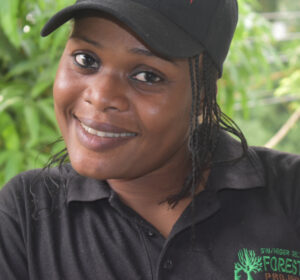University of Oxford
11a Mansfield Rd
OX1 3SZ
UK

Rachel Ashegbofe Ikemeh
Background
Research Interests
Because I typically didn’t have a science background when starting out in conservation, my research interest evolved with my growing experience in the field from basically looking at conservation issues to specific species to human-wildlife interactions. However, my specialist research interest has since been centred on exploring practical conservation strategies and solutions in dynamic landscapes. I’m attracted to this because I found that conservationists have increasing become adept in identifying problems and attempts at solutions most often brings about many fails we are often reluctant to talk about. But it is in these ‘fails’ that we are able to also find the solutions that may be effective and badly needed.
Current Research
My experiences in species conservation has informed my current research which I believe is to conceptualize strategies and implement actions that are relative, adaptable and for formulating conservation solutions. In the beginning of my career, I considered that traditional activities that are either species-focused, site-based or habitat-based management approaches are guaranteed to conserve target species. However, in recent years, I have learned through first-hand experience that species conservation approach ought to be developed in the context of the unique dynamics and interactions of the physical, economic and socio-political environment where the species is located. In other words, the ‘one size fits all’ approach or IUCN conservation models to conservation management needs to be examined critically in present-day natural landscapes, thus, innovation and inclusiveness cannot be compromised. My approach to species conservation have evolved over the years in support of integrated plans and actions that should emanate from a broad spectrum of stakeholders, particularly actors at the local level. This joint and participatory approach strive to reduce conflict, ensure range-wide as well as long-lasting impact and also serves as a means by which conservation actions can be sustained. As a result, I believe strongly that species conservation approach should not be limited to identifying core conservation issues and/or proffering textbook or expert solutions for management but to seek out opportunities in developing partnerships amongst various stakeholders and establish cross-sector relationships that will deliver long-term sustainable solutions.
Brief CV
I am the Founder/Director of SW/Niger Delta Forest Project, a grassroots-focused organization that is pioneering conservation efforts for some highly threatened forest habitats and primate populations in southern Nigeria. I am currently the Co-Vice Chair for the IUCN/SSC Primate Specialist Group African Section; Member of the International Primatological Society (IPS) education committee and a National Geographic explorer.
I have been working to conserve highly threatened primate populations particularly endangered chimpanzee populations in southwestern Nigeria and critically endangered Niger Delta red colobus monkey endemic to central Niger Delta, Nigeria. To conserve these fragile populations of unique wildlife, I have led the creation of two protected areas and have also taken on the management of these new PAs in areas overlapping one of the highest human population densities in the world. Today, SW/Niger Delta Forest Project having just about 40 staff member recruited from local instituitions and communities puts conservation footprint in about 500,000 hectares of wildlife habitats in very highly threatened ecosystems and also areas of high-security risks. In other capacities, I have contributed to developing and implementing biodiversity action plans, management plans and species-based conservation plans.
- 2016 – date Co-founder, African Primatological Society (APS)
- 2016 – date Co-Vice Chair – Africa Section, IUCN/SSC Primate Specialist Group
- 2018 – date Member, IPS Education Committee
- 2020 National Geographic Explorer
- 2020 – date Member, IUCN SSC Primate Specialist Group ARRC Task Force
Papers
- OATES J.F., WOODMAN N., GAUBERT P., SARGIS E.J., WIAFE E.D., LECOMPTE E., DOWSETT-LEMAIRE F., DOWSETT R.J, GONEDELE S., IKEMEH R.A., DJAGOUN CHABI, TOMSETT L., AND BEARDER S.K. A new species of tree hyrax (Procaviidae: Dendrohyrax) from West Africa and the significance of the Niger–Volta interfluvium in mammalian biogeography Zoological Journal of the Linnean Society, 2021, XX, 1–26.
- Jessica Junker, Silviu O Petrovan, Victor Arroyo-RodrÍguez, Ramesh Boonratana, Dirck Byler, Colin A Chapman, Dilip Chetry, Susan M Cheyne… Rachel A Ikemeh etc., A Severe Lack of Evidence Limits Effective Conservation of the World’s Primates, BioScience, Volume 70, Issue 9, September 2020, Pages 794–803, https://doi.org/10.1093/biosci/biaa082
- Ikemeh, R.A. (2015) Into the Land of Oil and Wood: Conserving the critically endangered Niger Delta red colobus monkey. Explorers Journal frontiers Spring 2015 pg. 28-32
- Ikemeh, R.A. (2015). Assessing the Population Status of the Critically Endangered Niger Delta Red Colobus (Piliocolobus epieni). Primate Conservation 29: 1-10.
- Ikemeh R.A. (2013). Population Survey of Nigerian-Cameroon Chimpanzee (Pan troglodytes ellioti) in Southwestern Nigerian Priority Sites: Idanre Forest Cluster and Ise Forest Reserve. African Primates Journal. November 2013.
- Ikemeh R.A. (2013). Sustainable Forest Management in a Human Dominated Landscape and Its Implications for Biodiversity Conservation: A Nigerian Lowland Forest Perspective. Reports in Biodiversity Studies, Dove Press. November 2013.
- Ikemeh, R.A., 2006. The King and I. BIODIVERSITY: Journal of life on earth (7) 3 & 4: 2. Tropical Conservancy, Canada. http://www.tc-biodiversity.org/Biodiversity7-3-4TOC.pdf
